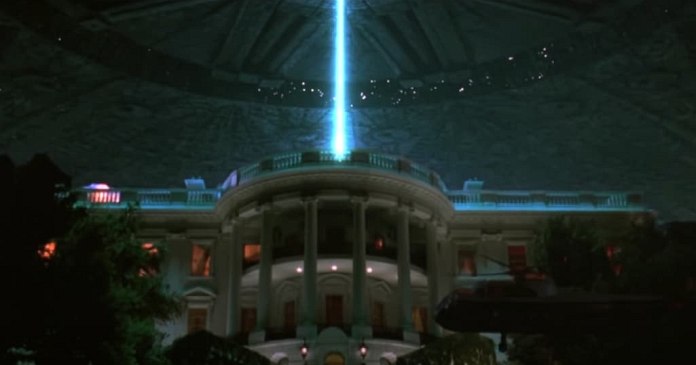
Creating an action-packed blockbuster can be a thrilling and pricey adventure, leaving studio executives eager to find ways to save money. One ingenious solution that satisfies both the budget and the creative minds behind the scenes is borrowing military gear. The incredible collaboration between Hollywood and the US military has been a long-standing tradition, with the military more than willing to lend a helping hand under specific conditions.
The military’s support can make or break a project. Where else can you get your hands on an aircraft carrier, a jet, or even hire an army of extras without breaking the bank? However, this partnership does come with a catch, and not every writer or director is willing to play by the rules. To qualify for military assistance, there are three key conditions that must be met.
Firstly, the film must showcase the military in an authentic and accurate light. Secondly, it should highlight the military’s invaluable work and present them in a positive manner, enlightening the public about their dedication. Lastly, the film should have a fantastic impact on recruitment and keeping the military’s talented individuals on board.
In this captivating collection, we delve into the stories of filmmakers who sought military support but were unable to meet the demanding criteria set by the US Department of Defense. As a result, their requests for approval were sadly denied.
1. Forrest Gump’ – A Little Too Real For The Army’s Liking
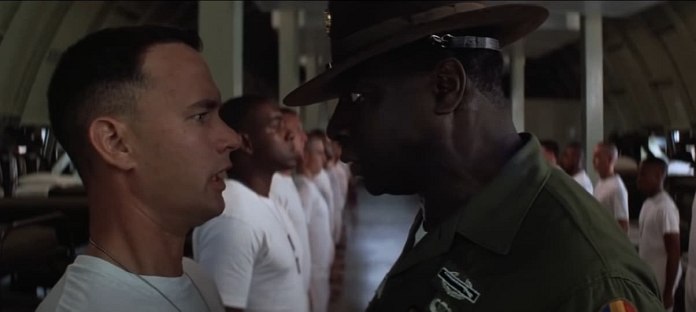
In the original treatment of the novel, the film depicted Gump as part of a unit consisting of intellectually challenged men. This didn’t sit well with the US Army, as they didn’t want to be associated with a dim-witted protagonist or the idea of such a unit in the Vietnam War.
However, it turns out that this unit actually existed. Although Gump is a fictional character, there was indeed an initiative called Project 100,000 in 1967, led by Defense Secretary Robert McNamara. Its aim was to lower the intelligence standards for recruiting soldiers into the Army, allowing less intelligent young men to serve in combat. Approximately half of these soldiers were mockingly referred to as “McNamara’s Morons” by their fellow servicemen, with an IQ of 71 or lower. This means that Gump would have been considered one of the smarter members of this unit.
The Army also took offense to Gump’s habit of calling his commanding officer “Lt. Dan” and was shocked by the scene where Gump moons President Lyndon B. Johnson while in uniform. Due to these issues, the Army refused to support the project. However, the Marines were more open to the idea and would have been willing to assist if Gump was portrayed as a Marine instead. Nevertheless, the film’s creators felt that the Army was an integral part of the story, so they turned down the offer.
Actors: Tom Hanks, Robin Wright, Gary Sinise, Mykelti Williamson, Sally Field
Released: 1994
Directed by: Robert Zemeckis
2. Platoon’ – Too Much For The Army

The Pentagon’s Office of Communications unsurprisingly rejected Oliver Stone’s grim account of a platoon’s actions during the Vietnam War. The screenplay, based on Stone’s own experiences in Vietnam, fearlessly depicted the darker aspects of the highly divisive conflict.
Pentagon public affairs official, Donald Baruch, thoroughly reviewed the script and made it clear that the Pentagon had no interest in supporting the production. Baruch highlighted several problematic areas in the script, including the brutal murder and rape of innocent Vietnamese villagers by US soldiers, the coldblooded killing of a fellow soldier, widespread drug abuse, the stereotyping of Black soldiers, and the portrayal of the majority of soldiers as illiterate troublemakers. The script was loaded with unrealistic and highly unfavorable depictions of American soldiers.
Baruch did, however, suggest the possibility of collaboration if Stone made significant changes to the script. It’s hard to envision what a sanitized version of Platoon would even look like. Despite the military coup happening in the Philippines, where the production took place, Stone stayed true to his vision. The unrelenting brutality of the film resonated with audiences and critics alike, earning it multiple Academy Awards.
The war crimes committed against Vietnamese civilians in the movie had real-life parallels, and incidents of “fragging” – the killing of one US soldier by another – were indeed documented. While the rampant drug use and the portrayal of less-than-intellectual troops may have hit a little too close to reality.
Actors: Tom Berenger, Willem Dafoe, Charlie Sheen, Forest Whitaker, Francesco Quinn
Released: 1986
Directed by: Oliver Stone
3. An Officer and a Gentleman’ – The Navy Tried To Sink The Production
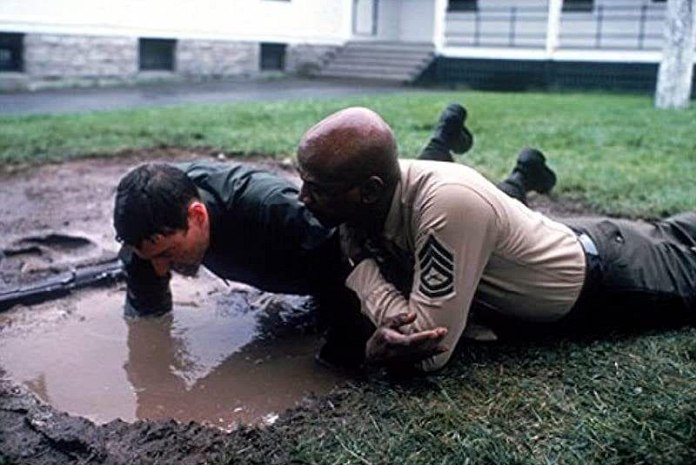
Douglas Day Stewart’s screenplay was inspired by his personal experiences in the US Navy during the 1960s. However, to the Navy’s disappointment, they did not want any involvement with the film. They labeled the script as “profane and morally objectionable throughout.”
One of the Navy’s objections stemmed from a Jody call in which recruits chanted the gruesome line, “napalm sticks to kids.” The Navy claimed that although this line might have been used in the past, it was no longer acceptable. Other issues included problems with Zack Mayo’s backstory in the Philippines, the language used by Gunnery Sgt. Emil Foley, and the suicide of a cadet who failed to complete the training.
To ensure accuracy, director Taylor Hackford conducted research in Pensacola, FL, and confirmed that the “napalm sticks to kids” line was indeed still in use. Despite the Navy’s objections, Stewart refused to make any changes. Consequently, the studio had to seek assistance from the Canadian Navy instead.
When the US Navy discovered this arrangement, they made a few calls, causing the Canadians to withdraw their support. However, the US Marines were more willing to assist, proposing that the main character join their ranks instead. They were even open to keeping the angle of a cadet taking his own life, suggesting that if someone washed out of Marine school, such extreme measures might be considered. Nonetheless, this offer was declined as Stewart’s story focused on the Navy.
Nevertheless, the Marines unofficially provided support for the film. By chance, a harrier aircraft performed a low fly-by just as Hackford had a film crew set up, adding an unexpected element to the production.
Ironically, despite the initial negative response from the Navy, the film had a positive impact on recruitment. Stewart later revealed that during a visit to the Pentagon, Admirals expressed their gratitude. The movie had generated a newfound appreciation for the military, resulting in a 30% increase in enrollment across all branches. They thanked Stewart and apologized for their lack of support.
Actors: Richard Gere, Debra Winger, Louis Gossett, David Keith, Robert Loggia
Released: 1982
Directed by: Taylor Hackford
4. Die Hard 2′ – Uncomfortably Close To Current Events
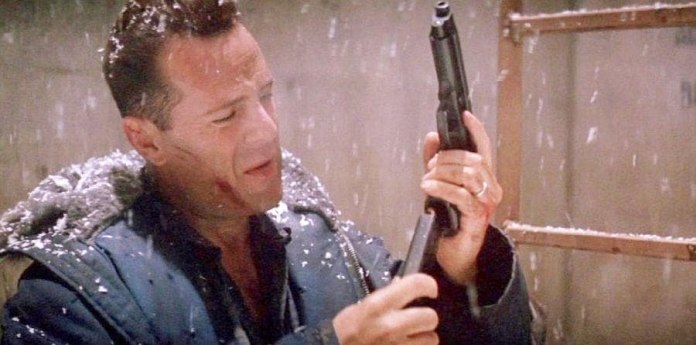
Die Hard 2, based on Walter Wager’s novel 58 Minutes, had its screenplay penned by Steven E. de Souza, a renowned screenwriter of the 1980s and ’90s. Taking inspiration from the Iran-Contra Affair, a controversial event during the Reagan administration, and the efforts against Panamanian dictator Manuel Noriega, de Souza crafted a script that incorporated elements from various instances of American involvement south of the Rio Grande. Understandably, this concoction of a backstory was not something the Department of Defense would readily embrace.
Drawing comparisons between Noriega and the villainous General Ramon Esperanza is not a far-fetched idea. Furthermore, with the primary antagonist being a treacherous ex-Special Forces operative of American origin, it was evident that seeking military support for this project would prove to be an uphill battle.
Actors: Bruce Willis, Bonnie Bedelia, William Atherton, Reginald VelJohnson, Franco Nero
Released: 1990
Directed by: Renny Harlin
5. Independence Day’ – Not Sufficiently Pro-Military
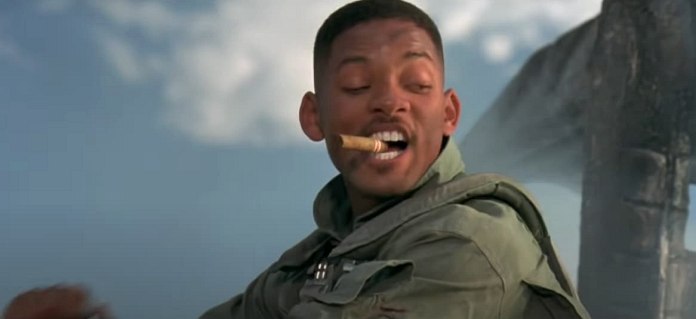
The 1996 blockbuster Independence Day faced some challenges when it came to receiving military assistance. The Pentagon had some concerns about the script, but screenwriter Dean Devlin was open to addressing them – except for one major issue.
The US Air Force wasn’t pleased with the idea of an advanced extraterrestrial civilization easily defeating them in combat. They also had reservations about Captain Steven Hiller, played by Will Smith, as a representative of the Air Force. They felt his cockiness and his relationship with an exotic dancer didn’t reflect the ideal image of an Air Force officer. Those witty remarks that the audience loved weren’t considered appropriate for someone in the military.
Another concern was the portrayal of Russell Casse, played by Randy Quaid, a drunken crop-duster pilot suddenly flying an F-18 without proper training. The Pentagon didn’t find this believable or realistic. They were also unhappy with the fact that it was civilian David Levinson, played by Jeff Goldblum, who ultimately saved the day. They insisted on rewriting his character to have a military background.
While Devlin was willing to make those changes, the biggest point of contention was the inclusion of Area 51. The military demanded that all references to it be removed before they would support the film. It’s hard to imagine the movie without that iconic scene, but the studio couldn’t either. So, despite the potential for cost savings with the proposed revisions, the production moved forward as originally planned. In the end, even with its high production costs, the film became a massive success.
Actors: Will Smith, Bill Pullman, Jeff Goldblum, Mary McDonnell, Judd Hirsch
Released: 1996
Directed by: Roland Emmerich
6. Heartbreak Ridge’ – Not Reflective Of The ‘New Army’
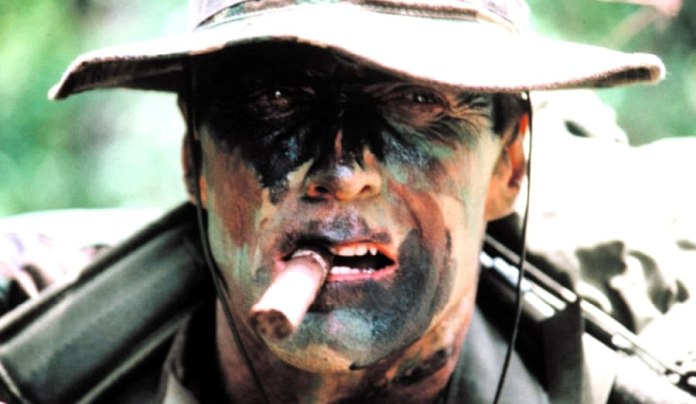
In this particular case, support was initially provided but then abruptly taken away, much to Clint Eastwood’s frustration. After a long and challenging production process, the Department of Defense decided to withdraw its support, claiming that Eastwood had not made the necessary changes to the script. However, Eastwood viewed these changes more as suggestions rather than strict commands, causing some disagreement.
The objections primarily revolved around the lead character’s use of profanity and his outdated sensibilities that did not align with the modern military’s perspective. Ironically, that was the whole point of Gunnery Sgt. John Highway’s character – he was meant to portray someone struggling to adapt to the contemporary world. When the Army declined to support the project, the Marines stepped in, but this required some adjustments to Highway’s background.
The title of the film, Heartbreak Ridge, was derived from a battle in the Korean War that the Marines were not involved in. Therefore, a few lines were added to indicate that Highway had served in the Army before joining the Marines after Korea. Additional issues arose due to Highway’s unflattering account of a brothel being shut down by Congress and his refusal to turn a blind eye to a quartermaster who was embezzling funds. As we all know, the use of foul language, womanizing, and theft are things that never occur on military bases!
Eastwood was open to making compromises, but not if it meant sacrificing the integrity of the story or the authenticity of the character.
Actors: Clint Eastwood, Marsha Mason, Everett McGill, Moses Gunn, Eileen Heckart
Released: 1986
Directed by: Clint Eastwood
7. Mars Attacks!’ – Made The Military Look Dumb
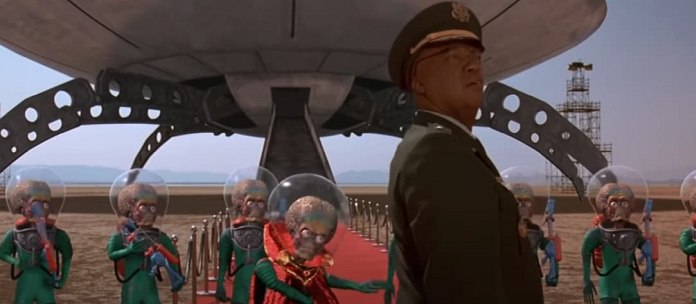
Tim Burton’s Mars Attacks! was a wacky sci-fi comedy that had a star-studded cast and relied heavily on mind-blowing special effects. However, the extravagant production costs skyrocketed due to these effects. While support from the military could have alleviated some of the production challenges, unfortunately, the Pentagon did not find the film amusing and declined to participate.
The military had several objections to Mars Attacks! Firstly, they found the portrayal of the generals to be ridiculously dim-witted. Additionally, the military’s incompetence in dealing with the Martians was highlighted. Lastly, the fact that a civilian accidentally discovers the aliens’ only weakness did not sit well with the military. Screenwriter Jonathan Gems vividly recalled the arduous process of creating this peculiar movie:
“Let me tell you, this film was a nightmare to write and make. I poured my heart and soul into it, but Tim worked twice as hard as I did. By the end, he was completely burnt out and emotionally drained. He was a wreck. I remember him mentioning that he didn’t want to ever make another movie again when he went to India with his girlfriend for about a month.”
Actors: Jack Nicholson, Glenn Close, Annette Bening, Pierce Brosnan, Danny DeVito
Released: 1996
Directed by: Tim Burton
8. Crimson Tide’ – A Failure To Communicate

The 1995 thriller Crimson Tide was a big hit with both audiences and critics, but unfortunately, it didn’t win over the Navy. This was a rare occasion where producer Jerry Bruckheimer couldn’t get the military on board with one of his movies. The Navy initially showed interest in supporting a film about nuclear submarines and even allowed studio executives to visit the USS Florida during the early stages of production. However, their enthusiasm quickly waned when they received an early version of the script. As a result, they decided not to provide any further cooperation.
One of the main reasons for the Navy’s disapproval was the mutiny of Lt. Cmdr. Ron Hunter, played by Denzel Washington, who tries to prevent Captain Frank Ramsey, portrayed by Gene Hackman, from carrying out a preemptive nuclear strike. This plot point didn’t sit well with the Navy, and Lt. Cmdr. Ken Ross, a Navy spokesperson, made it clear why they opposed the film. He stated that the portrayal of military personnel, especially Navy personnel, in Crimson Tide did not realistically depict the men and women serving in today’s Navy. According to him, the Navy personnel are fully aware of their responsibilities and have always performed exceptionally well.
Despite the Navy’s refusal to cooperate, the French Navy stepped in to lend their support to the project. The aircraft carrier seen in the film is the Foch, provided by the French Navy. On the other hand, the USS Alabama was not as willing to participate. However, it is legal to film military vessels from public property, regardless of their preference. So, director Tony Scott and his crew set up at Pearl Harbor and managed to capture the desired shot of the Alabama, coincidentally sharing the same name as the submarine in the movie, diving into the water.
Actors: Denzel Washington, Gene Hackman, George Dzundza, Viggo Mortensen, James Gandolfini
Released: 1995
Directed by: Tony Scott
9. Thirteen Days’ – LeMay’s Own Words Weren’t Acceptable

This 2000 historical political thriller tells the story of the 13 days during the 1962 Cuban Missile Crisis. The Pentagon had concerns about how the film portrayed the hawkish viewpoint of the chiefs-of-staff, especially Curtis LeMay. Additionally, they objected to the depiction of a reconnaissance plane incident, arguing that it presented an inaccurate picture of the actual events.
While Thirteen Days did take some liberties for the sake of storytelling, there is no doubt that LeMay did support military intervention in Cuba – this is well-documented. The film also showcased a letter from President John F. Kennedy to the pilot of the lost U-2 aircraft, Major Rudolf Anderson Jr., but this did not impress the officials.
Rather than altering history to satisfy the Pentagon, the producers decided to independently source 1960s-style American aircraft from the Philippines. They completed the project without any military assistance. Interestingly, the film was the first to be screened at the White House, with incoming President George W. Bush hosting the screening in February 2001.
Actors: Kevin Costner, Bruce Greenwood, Steven Culp, Dylan Baker, Michael Fairman
Released: 2000
Directed by: Roger Donaldson
10. Commando’ – Matrix’s Backstory Was A Problem

In 1985, a thrilling action film hit the screens, featuring the iconic Arnold Schwarzenegger effortlessly plowing through countless clueless henchmen, all while delivering unforgettable one-liners. With the witty and sarcastic Cindy (Rae Dawn Chong) by his side, it’s evident that the movie doesn’t take itself too seriously and invites us to join in on the fun. However, the production did face its challenges, going slightly over budget and missing out on potential savings if the Army had provided assistance.
One particular aspect that raised concerns was the intense battle against the fictional troops of Val Verde, a stand-in created by writer Steven E. de Souza whenever a vaguely Central American nation is required. While this fictional conflict might have made the Pentagon uneasy, the primary issue revolved around the backstory of Col. John Matrix (Schwarzenegger) and the unit he commanded. The ambiguous nature of the unit plays a crucial role in the motivation of the film’s antagonist, Captain Bennett (Vernon Wells). However, it was an aspect that the US military couldn’t endorse. Their support was withheld due to the suggestion that they had or currently have a specialized unit trained solely for murder and plunder, an idea they couldn’t accept.
Actors: Arnold Schwarzenegger, Rae Dawn Chong, Dan Hedaya, Vernon Wells, David Patrick Kelly
Released: 1985
Directed by: Mark L. Lester